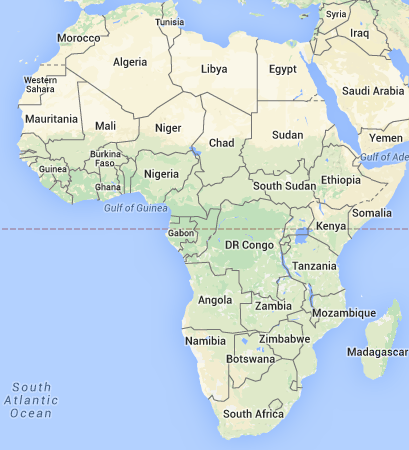Africa is an enormous continent that has been actively developing during the last few years. However, numerous problems affect civilians. There is a long history of various conflicts and boundary disputes that are worsened by political crises. They often happen because of misunderstandings, and differences in religion. It should be said that language barriers often cause significant problems. Some countries on the continent are English-speaking, and some are French-speaking (see map. 1).

There have been numerous instances of slavery, discrimination and racism that have caused hatred between Muslim North and African South. Ethnicity and religion are two major factors that lead to prejudice.
There is a known tension between Kenya and Somalia. Both countries have relatively small GDP, and many disputes often take place in their territories. They are mostly minor, but there are some severe ones. Currently, there is a conflict with the Al-Shabab group that is based in Somalia. It has escalated after the entrance of Kenyan troops into Somalia during a military operation in 2011 (BBC News par. 5). The terrorist movement has declared war on the country in 2015. Kenya has responded by bombing the bases of the group. There were many efforts to deal with this conflict, and international help was provided. Also, Somalia currently claims Somaliland, Ogaden and Socotra.
Sudan and South Sudan should also be discussed. Islam is a dominating religion in the first country, and Christianity is in a second. This causes a tension especially since South Sudan has gained independence. There have been many fights over the regions that are rich in oil such as Abyei Area. Air attacks have injured numerous civilians. The Sudanese government is currently in control of the territory. This is worsened by the fact that currently there is a civil war in South Sudan, and it is extremely hard for such a young nation (Rosen par. 4). Ilemi Triangle is claimed by both South Sudan and Kenya, and Ethiopia is also afflicted.
Mali is one of the most impoverished countries on the continent. Islamic groups often act against the government. The situation has been slowly stabilizing, but currently there is a conflict. Hoije states that “in recent months, the area has been the scene of clashes between rival armed Tuareg groups and their allies in northern Mali” (par. 4). Differently put, there are numerous battles for logistical networks and territories. It should be said that some terrorist movements are fighting for autonomy, and some of those fights have led to success. The rebellion should be controlled because there are numerous victims. The biggest issue is that they often attack peacekeepers and civilians.
In conclusion, there have been numerous fights for independence and civil wars in Africa over the last few years. Some of the conflicts are complicated by differences in traditions and religion. Many countries are underdeveloped and destitute. There is a need for intervention to guarantee the safety of civilians, and some of these disputes may affect the global economy. However, it should be noted that foreign interferences often also cause conflicts. Bagayoko states that “all francophone countries have centralized presidential systems, in which the security bureaucracies report directly or indirectly to the President” (64). In other words, it is easier to implement in particular regions. The necessary measures should be taken to prevent terrorist attacks.
Works Cited
Africa [map]. 2015. Scale undetermined; using “Google My Maps”.
Bagayoko, Niagale. “Security Systems in Francophone and Anglophone Africa.” IDS Bulletin 43.4 (2012): 63-74.
BBC News. Why Is Al-Shabab Targeting Kenya? 2015. Web.
Hoije, Katarina. Mali Conflict: South Is South, North Is North, Never The Twain Shall Meet? 2015. Web.
Rosen, Armin. South Sudan’s Civil War Is One Of The Worst Conflicts On Earth – With No End In Sight. 2015. Web.